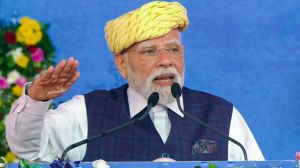Stay updated with the latest - Click here to follow us on Instagram
Section 377 in Supreme Court tomorrow: Here’s what you need to know
A five-judge constitution bench headed by Chief Justice Dipak Misra had reserved its verdict on July 17 after hearing various stakeholders for four days, including gay rights activists.
 A five-judge constitution bench headed by Chief Justice Dipak Misra had reserved its verdict on July 17 after hearing various stakeholders for four days, including gay rights activists.
A five-judge constitution bench headed by Chief Justice Dipak Misra had reserved its verdict on July 17 after hearing various stakeholders for four days, including gay rights activists.
The Supreme Court is likely to pronounce on Thursday its much-awaited verdict on a batch of petitions seeking decriminalisation of 158-year-old colonial law under Section 377 of the IPC which criminalises consensual gay sex. A five-judge constitution bench headed by Chief Justice Dipak Misra had reserved its verdict on July 17 after hearing various stakeholders for four days, including gay rights activists. Besides the CJI, the bench also comprised justices R F Nariman, A M Khanwilkar, D Y Chandrachud and Indu Malhotra.
The Centre, which had initially sought adjournment for filing its response to the petitions, had later left to the wisdom of the court the issue of legality of the penal provision on the aspects of criminalising consensual unnatural sex between two consenting adults.
ALSO READ: SC to pronounce verdict tomorrow on pleas challenging its validity
2) What was the High Court ruling on Section 377 in 2009?
Following a PIL by Delhi-based Naz Foundation, an NGO fighting for gay rights, the Delhi HC on July 3, 2009, struck down Section 377 of the IPC, holding that it violated the fundamental rights of life and liberty and the right to equality as guaranteed in the Constitution. “Section 377 of the IPC, in so far as it criminalises consensual sexual acts of adults in private, is violative of Articles 21 (Right to Protection of Life and Personal Liberty), Article 14 (Right to equality before law) and Article 15 (Prohibition of discrimination on grounds of religion, race, caste, sex or place of birth] of the Constitution,” a division bench of Justice A P Shah and Justice S Muralidhar said in a 105-page order.
The HC held that the Section 377 denied dignity to an individual and criminalised their core identity on the basis of their sexuality adding that it also violated Article 14 by targeting homosexuals as a class.
3) Why did the Supreme Court reverse the High Court verdict?
The Supreme Court reversed the HC verdict in December 2013 and upheld the constitutional validity of Section 377 of IPC, while giving the power to the legislature to formulate a law on homosexuality. The judgment said, “We hold that Section 377 does not suffer from the vice of unconstitutionality and the declaration made by the division bench of the High Court is legally unsustainable.” Justice GS Singhvi and Justice S J Mukhopadhaya, who pronounced the verdict, justified its order by saying, “The High Court overlooked that a minuscule fraction of the country’s population constitute lesbians, gays, bisexuals or transgenders and in last more than 150 years, less than 200 persons have been prosecuted for committing offence under Section 377.”
4) How will the Right to Privacy judgment affect Section 377?
In August 2017, the Supreme Court, in a landmark verdict, declared right to privacy a fundamental right, ushering in hope for the gay and LGBT community. The apex court had concluded that privacy included at its core the preservation of personal intimacies and that sexual orientation was an essential attribute of privacy. “Discrimination against an individual on the basis of sexual orientation is deeply offensive to the dignity and self-worth of the individual. Equality demands that the sexual orientation of each individual in society must be protected on an even platform. The right to privacy and the protection of sexual orientation lie at the core of the fundamental rights guaranteed by Articles 14, 15 and 21 of the Constitution,” the SC held. The SC decision will definitely strengthen arguments for decriminalisation of homosexuality.
5) What happens now?
On Thursday, the Supreme Court is likely to pronounce on Thursday its much-awaited verdict on a clutch of petitions seeking decriminalisation of a 158-year-old colonial law under Section 377 of the IPC which criminalises consensual gay sex. A five-judge constitution bench headed by Chief Justice Dipak Misra had reserved its verdict on July 17 after hearing various stakeholders for four days, including gay rights activists.
The apex court had asserted that courts cannot wait for a “majoritarian government” to decide on enacting, amending or striking down a law if it violates fundamental rights.
6) What was the Supreme Court verdict on transgenders?
In the April 2014 verdict, hailed by gender rights activists, the apex court directed the government to declare transgenders a ‘third gender’ along with male and female. It also asked the Centre to include them in the OBC quota. Underlining the need to bring them into the mainstream, the verdict by a bench of Justices KS Radhakrishnan and AK Sikri said transgenders should have all rights under the law, including marriage, adoption, divorce, succession, and inheritance.







